This article may contain affiliate links.
Updated: August 19, 2025
Are you planning a trip to Thailand for the first time? In this guide, I cover everything you need to know—from important paperwork like visas and vaccines to practical tips on transportation, safety, and budget.
After spending three years living in Thailand, I’ve gathered my best travel tips to help you make the most of your experience. If you have any questions, leave a comment below, and I’ll do my best to help. 😉
Tips for Traveling to Thailand
1. Visa, Passport and TDAC
🔹 Visa
If you're from the U.S., Australia, Canada, or the UK, you don’t need a visa to visit Thailand. Instead, you’ll get a visa exemption, allowing you to stay for up to 60 days with an entry stamp.
A total of 93 countries qualify for this exemption. You can check the full list in the image below.
Also, make sure your passport is valid for at least six months beyond your departure date from Thailand.
If you want to stay longer, you can extend your visa for 30 more days at an immigration office for 1,900 baht (about €50 / 54USD). It’s a simple process.
If you overstay you’ll be fined 500 baht (about €14 / 15US) per day when leaving the country.

If your country isn’t listed for visa exemption, check the details on the official Thai visa website.
⭐ Related article: Practical Tips for Living in Thailand, there I also talk about visa run.

🔹 Other requirements
- Passport: it must be valid for at least 6 months from your departure date.
- TDAC: starting May 1, 2025, you’ll need to fill out the Thailand Digital Arrival Card within 3 days before your trip. You’ll have to enter your personal details, travel info, accommodation, and health info on the official Web.
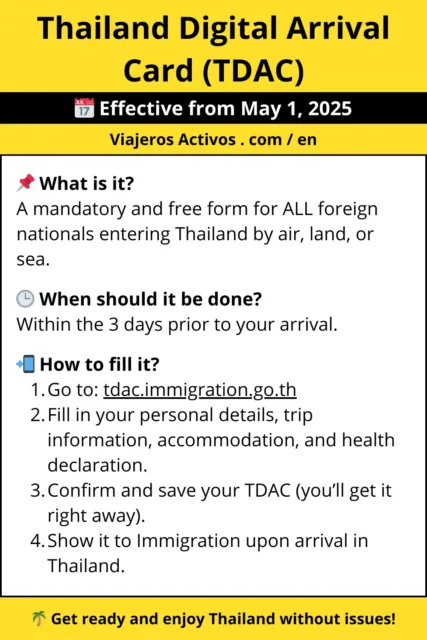
🤑 If you want to save on your next adventure, use this link from Booking to get 15% off your stay.
2. Vaccines and Health
✅ Mandatory Vaccine
There’s only one required vaccine for traveling to Thailand: yellow fever, for countries where it’s endemic.
If you're from the U.S., Canada, Australia, or the UK, you don’t need the yellow fever vaccine unless you’ve recently been to a country where it’s present.
Yellow fever is endemic in 34 African countries and 13 American countries according to PAHO, including most of South America (except Chile and Uruguay). Thailand requires proof of vaccination from travelers coming from a total of 45 countries.
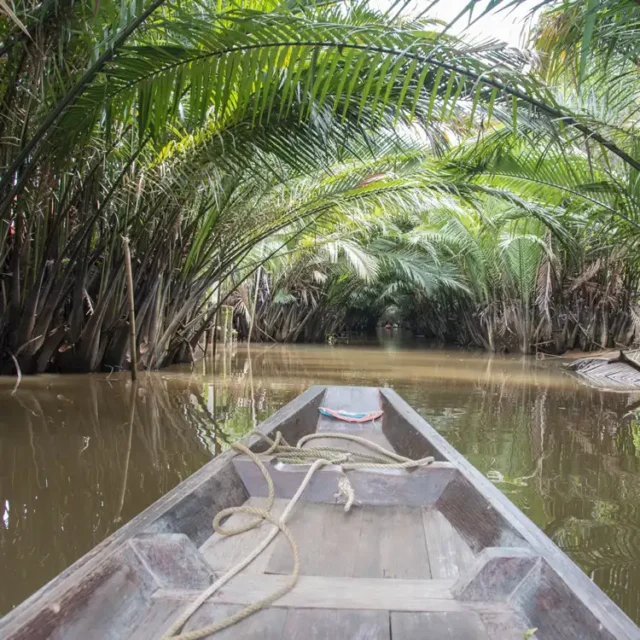
✅ Recommended Vaccines
Other recommended vaccines are the same as for most international trips: MMR (Measles, Mumps, and Rubella), Tetanus – Diphtheria – Pertussis, Hepatitis A and Typhoid fever.
If you’ll be spending a lot of time around animals, getting the rabies vaccine is also a good idea.
The best thing to do is check with your local International Vaccination Center for personalized advice based on your medical history.
✅ Mosquito Repellent
One essential item for your trip is a good mosquito repellent to prevent dengue, which is quite common in Thailand.
If you're traveling during the rainy season, visiting national parks, or going hiking, I recommend bringing a strong repellent with DEET like this one. It really keeps mosquitoes away! 😅
If you're traveling in the dry season or not planning to hike, you can buy repellent at 7-Eleven. It's cheap and smells great, though it’s not as effective.
👍 My two cents: Always carry repellent with you—you never know when you’ll run into a swarm of mosquitoes!
⭐ Related article: Vaccination Guide for Thailand.
3. Travel Insurance
Travel insurance isn’t mandatory for Thailand, but it’s highly recommended since medical expenses can be very expensive. 😖
Just to give you an idea, a day in a Thai hospital can cost up to 5,000 USD, surgery around 20,000 USD, and repatriation up to 250,000 USD.
Since medical care in Thailand is so expensive, hospitals require upfront payment if you don’t have international insurance.
I recommend this travel insurance for Thailand, with excellent medical, accident, repatriation and other coverage, and you get a 5% off with that link.
I had to use my insurance in Thailand, and the customer support was quick. In the end, I only needed a one-day hospital stay, and thankfully, it wasn’t anything serious. Luckily, my insurance covered everything from the start, which was a huge relief given Thailand’s medical costs.
⭐ Related article: What’s the Best Travel Insurance for Thailand
4. Safety in Thailand

Thailand is a very safe country to travel to, even if you’re a solo female traveler—I can tell you from my own experience.
Crime rates are much lower than in major European cities. While bag snatching from motorbikes has increased in Bangkok, it’s still uncommon. Pickpocketing is rare, but in tourist areas, it’s best to keep an eye on your belongings. If you’re a woman, you can walk alone at night without issues—just stay alert, like you would anywhere else.
⭐ Related article: Tips for traveling alone in Thailand, includes issues of safety, clothing and things no one tells you.
5. Scams in Thailand
You might come across some scams in Thailand, though most Thais are honest, and the government has been cracking down on these practices since they drive tourists away.

❌ Here are some common scams:
- Tuk-tuks and taxis: Be wary of “free” rides or drivers claiming that an attraction is closed.
- Motorbikes or cars rental: Check for scratches or damages to avoid unfair charges.
- Branded clothing and gemstones: Be careful where you buy, if it's too cheap, it's probably fake.
- Bars and restaurants without prices on the menu: Avoid them, especially at night, as things can get tricky. 😅
- “Free” night shows: Nothing is ever free—better to stay away..
⭐ Related article: 15 Most common scams in Thailand and how to avoid them.
6. Best Time to Visit
The best months to travel to Thailand are from January to March, during the dry season and peak travel season.
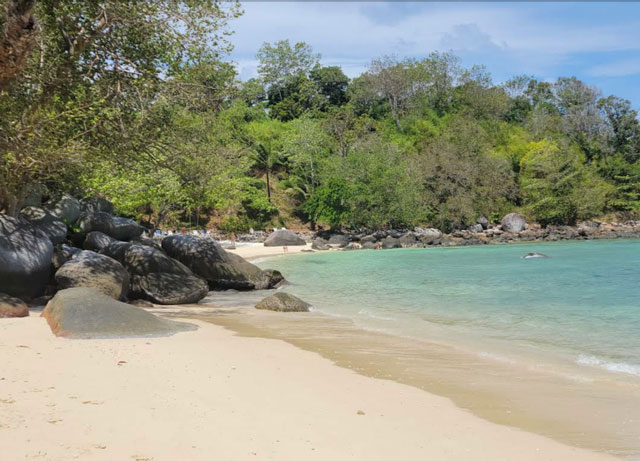
Rainy season lasts from May to October in most of the country, except for the Gulf of Thailand, where the worst months are October and November.
The monsoon might sound intense, but it’s usually not too bad—downpours are short, and it’s rare to have rain all day. However, during the heaviest rainy months, boats and tours can sometimes be canceled.
Below you have a general chart of Thailand’s rainfall by region:
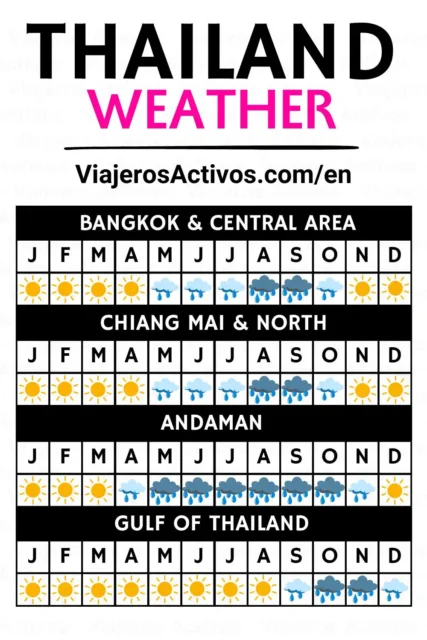
⭐ Related article: Best Time to Travel to Thailand
7. Money in Thailand
✅ Thai Currency
The currency in Thailand is the baht, and in general, it’s the only accepted currency. In tourist areas, some places may accept USD or EUR, but the exchange rate won’t be favorable.
✅ Card Payments
Most businesses, including many street vendors and hotels, accept cards or mobile payments. However, many small shops have started charging a 3% fee for card payments.
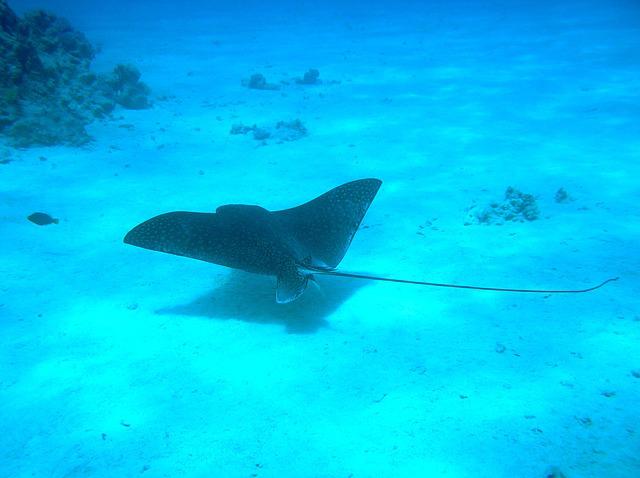
✅ ATMs
ATMs are easy to find in major cities and tourist areas, and the most widely accepted international cards are Mastercard and Visa.
When withdrawing from ATMs, Thai banks:
- Charge a 220 baht fee per withdrawal.
- Limit withdrawals to 1 or 2 times every 24 hours.
- Set a maximum withdrawal amount (usually up to 25,000 baht, depending on the bank).
👍 My two cents: To avoid ATM fees and withdrawal limits, go inside a bank and ask for a "cash advance." You’ll need a card in your name and your passport. Not all banks and branches offer this service, but Bangkok Bank and Krungsri Bank are your best bet.
Your bank may also charge a currency exchange fee, which can sometimes be high. I recommend using an online bank or wallet like Revolut or Wise, which have lower fees and better exchange rates.

✅ Currency Exchange
The most commonly accepted currencies for exchange are EUR, USD, and GBP.
Banknotes should be in good condition, with no tears or stains. You’ll also get a better exchange rate for larger denominations (50 or 100 €/USD).
I recommend exchanging money at SuperRich, which offers the best rates. They have offices at Bangkok’s BKK airport and in major cities.
8. Budget
If you're planning a trip to Thailand, you're probably wondering, how expensive is Thailand. While it’s pricier than other Southeast Asian countries, it’s still much cheaper than Europe or the U.S., with options for all budgets.
💲 Here are some prices to give you an idea:
- Street food: From 60-90 baht per dish.
- Mid-priced restaurants: Around 350 baht per meal.
- Accommodation: What you’d pay for a budget hotel in Europe or the U.S. can get you a luxury resort in Thailand, depending on the season and location.
- Transport: Very affordable. Domestic flights start at €30 / 32USD, and buses or trains are even cheaper. You can check schedules, prices, and book tickets on this website.
- Motorbike rental: TOne of the cheapest things in Thailand, with prices ranging from 200 to 300 baht per day, depending on the area.
In short, plan for a minimum of €70 ($74) per day, but you can spend much more depending on your preferences.
9. Shopping and Bargaining
In stores and malls, prices are fixed, but in markets and street stalls, bargaining is a must. 😅
Haggling is an art in Thailand, and locals find it boring when someone just pays the asking price. Plus, if you don’t bargain, you’ll definitely overpay.
It’s common to get up to a 30% discount when bargaining. Give it a try—you might find it addictive! 😄

10. Language
The official language in Thailand is Thai. In Bangkok and tourist areas, you’ll find people who speak English, though often at a basic level.
That’s why I recommend using short phrases and simple vocabulary. Finding someone who speaks Spanish or other languages is rare, except for guided tours, but you can always use a translation app on your phone.
From my experience, translation apps can be inaccurate when translating into Thai from languages other than English.

11. Affordable Flights to Thailand
From Europe, airlines like Emirates, LOT, Qatar Airways, Royal Jordanian, and Turkish Airlines offer cheap flights to Thailand. Turkish Airlines also has flights from the U.S. and Africa with a stopover in Istanbul.
To find the best deals, use a flight comparison site like Skyscanner, and if your dates are flexible, even better.
Also, search for flights to Suvarnabhumi Airport (BKK) in Bangkok, as they tend to be cheaper.

12. Public Transportation
Getting around Thailand by public transport is easy, with options like buses, trains, boats, and planes at reasonable prices.

To travel across the country, check this website—it shows all options with schedules, prices, and even lets you book tickets without going to the station.
⭐ Related article: Getting around Thailand: all means of transport.
13. Is there Uber? Alternatives
No, Uber stopped operating in Thailand in May 2018.
You can use Grab or Bolt, which work just like Uber and are available in Bangkok, Chiang Mai, Phuket, and other areas. These apps help you avoid language barriers and being overcharged.
14. Driving in Thailand
Thailand has one of the highest traffic accident death rates in the world. So, I only recommend driving if you have a lot of experience behind the wheel.
If you’re planning to rent a motorbike, do it only if you’re already experienced. If not, it’s better to use public transportation or join tours.
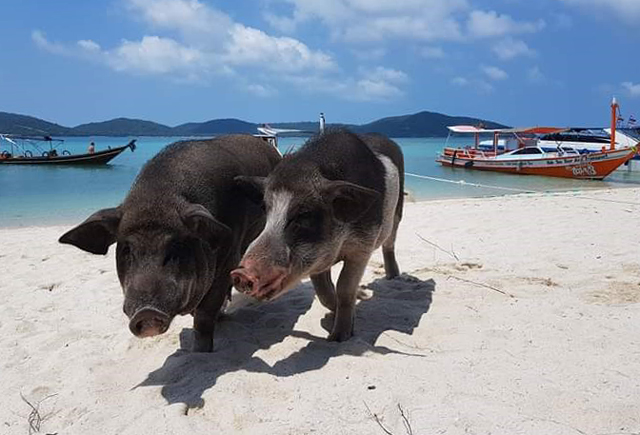
🚗 Where to rent a car in Thailand?
To rent a car, I recommend this website to avoid any kind of scam. At the same time, you'll get the best possible price—I’ve paid less than 12€ / 14 USD per day.
🛵 Where to rent a motorbike in Thailand?
For motorbike rentals, you’ll need to go directly to local rental shops, which you’ll find everywhere. My advice is to check Google Maps reviews in advance and compare prices.
A motorbike rental usually costs between 200 and 300 baht per day, depending on the location and season.
⭐ Related article: How to Rent and Drive a Motorcycle in Thailand.
15. Day-trips in Thailand
There are many places worth visiting on a tour because it's convenient, you get to see more, and sometimes it’s even cheaper.
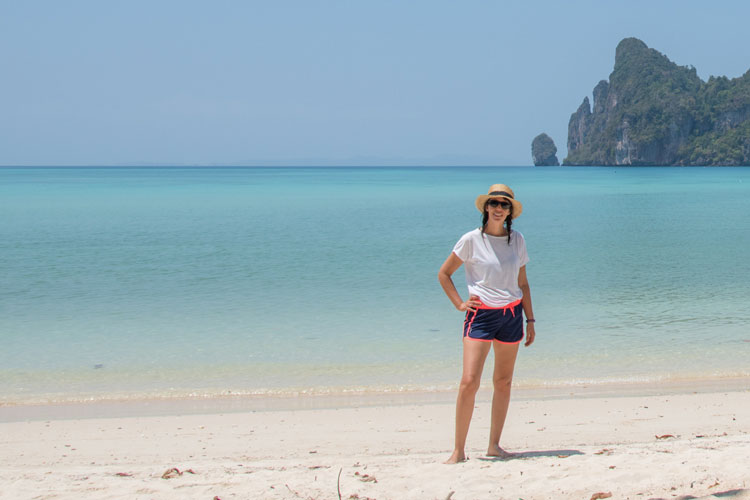
✅ Here are some of the most popular day-trips:
- Ayutthaya, the ancient capital of the Kingdom of Siam, with lunch included.
- Visit to the floating and railway markets.
- Chiang Rai tour with its stunning temples.
- Full-Day Tour to Phi Phi Islands from Krabi.
You might also find these articles helpful—there I cover the best places to visit in Thailand, including transportation options and day trips:
- 5 Best Day Trips from Bangkok
- 11 Best Day Trips from Chiang Mai
- 8 PERFECT Day Trips from Krabi
- 7 Best Day Trips from Phuket

16. Ethical Tourism with Animals
Animal tourism in Thailand is a complicated topic, and mistreatment is more common than it seems. Many travelers dream of visiting an elephant sanctuary, but unfortunately, most places that call themselves sanctuaries aren’t truly ethical.
Recognizing a real ethical sanctuary isn’t easy because they often tell visitors exactly what they want to listen. A good way to tell is by looking at who the focus is on: in fake sanctuaries, everything revolves around the tourists, not the animals.
Unfortunately, sometimes you realize it when you're already there, as happened to me in this "elephant sanctuary«. In this article, I share my experience, along with information on ethical sanctuaries recommended by FAADA and the brutal training to break their souls. 😥

The best thing you can do is avoid any place with animals—except for national parks, where you can see them in the wild. Khao Yai is one of the best places to spot wild elephants.
❌ If you still decide to visit a place with animals, avoid these at all costs:
- Drugged Animals: This happens in tiger sanctuaries so people can take photos with them.
- Animal performances: Places where elephants dance, paint, or perform tricks, all trained through punishment.
- Elephants riding: It damages their spine and causes serious health issues, not to mention the brutal training process.
- Photos with animals: Monkeys and elephants are forced to work to "earn" their food and often live in poor conditions.
- Bathing with elephants: It’s unhygienic and dangerous. Elephants can suddenly roll in the mud and crush you.
- Any kind of physical contact : To make them "safe" for human interaction, animals go through cruel training.
👍 My two cents: If you see an animal doing something it wouldn't do in the wild and someone is making money off of it, be suspicious. There's nothing good behind it.
17. Accommodation in Thailand
Thailand has accommodation options for all tastes and budgets. If you are looking for specific recommendations, check out my Thailand accommodation guide, you’ll find articles on the best areas and recommended hotels.

✅ Book online or directly at the hotel?
I prefer booking online—it saves me the stress of looking for a place upon arrival. Once, during a trip to Morocco, I decided to find hotels on the spot. While it worked sometimes, other times I wasted hours searching for available options.
In Thailand, the same thing can happen, especially in high season or during festivals when hotels fill up fast. Booking in advance saves time and lets you read reviews from other travelers, so you avoid unpleasant surprises.
To find great accommodation deals in Thailand, I recommend this website.
✅ Key Deposit
In some places, especially in Bangkok and the islands, hotels may ask for a key deposit, paid in cash or by card. If everything is in order when you check out, you’ll get your money back without any issues.
🤑 If you want to save on your next adventure, use this link from Booking to get 15% off your stay.

18. Mobile Data
If you want internet access during your trip, you have two options: a local SIM card or an eSIM.
✅ SIM card
The best local SIM is AIS, which has the best coverage. If not, go with True.
💰 Cost: 199 baht per month with unlimited data. You'll need a passport to buy it.
👉 Update April 2025: Travelers can now only buy a tourist SIM. I’m not sure how much the AIS one costs, but True has a 30-day option for just 350 baht. You’ll need to show your passport.
📍 Where to buy it: Official stores or 7-Eleven.
👍 Friendly Tip: Avoid airport official stores, as their plans can be up to 10 times more expensive. Instead, head to the 7-Eleven at the airport, where prices are the same as in the city.

✅ eSIM
If you’d rather have internet as soon as you arrive and skip searching for a store, an eSIM is the most convenient option. It’s easy to set up and doesn’t require removing your original SIM card. You also get a 5% discount with this link.
Just make sure your phone is compatible, as some older models don’t support eSIMs.
If you're visiting multiple countries, this eSIM works in 11 Asian countries, including Thailand, Cambodia, Vietnam, and Indonesia.
19. Electricity and Outlets
In Thailand, electricity is 220V and 50Hz, and the outlets are type A, B, and C. You can see what they look like below.
From my experience, type C outlets are the most common. I didn’t need an adapter for my chargers or hairdryer.
Depending on the voltage and plug type in your country, you might need a converter or adapter.

20. Clothing and Taking Off Shoes
In Thailand, you can dress however you like,even us women. However, in temples, the Grand Palace in Bangkok, or government offices, you need to cover your shoulders and knees (this applies to men, women, and children). If you're not wearing appropriate clothing, just wrap a sarong over your outfit, and you're good to go.
Taking off your shoes is common in temples and other places. Look for signs or check if there are shoes at the entrance. 😉

21. Thai Food
Thai cuisine is delicious, diverse, and famous for its balance of flavors—sweet, salty, sour, and bitter—to achieve umami. Plus, it’s made with fresh ingredients, and many dishes are cooked to order. Some, like Tom Yum soup, are even considered among the healthiest foods in the world.

🔥How spicy is Thai food?
Many dishes are very spicy, even more so than most Mexican food. If you can’t handle spicy food, you can order dishes with no chilies, like Pad Thai, though they might still have a touch of black pepper, which isn’t considered spicy in Thailand.
Another option is to ask for non spicy food, especially for dishes prepared at the moment, by saying:
- Mai ped kha (if you are a woman)
- Mai ped khrap (if you are a man)
Keep in mind that the "d" in ped sounds strong, similar to a hard "t" in English, and the "h" is silent. It translates to "no spicy, please."

✅ Is street food safe?
Yes! Street food in Thailand is safe, delicious, and affordable, with dishes costing just a few euros / USD. In fact, Thailand is one of the few countries where a street food vendor has a Michelin star. I recommend trying everything. 😋
⭐ Related article: 8 best Thai food dishes
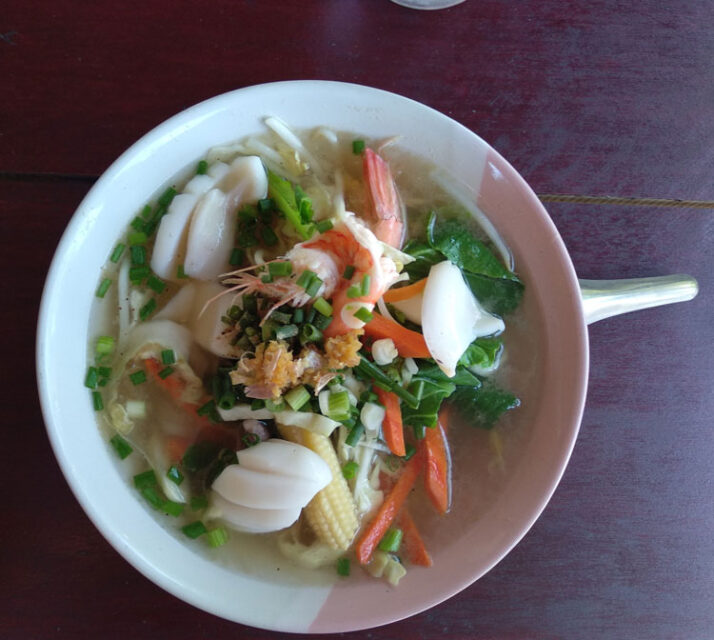
22. Drinking Water and Ice
✅ Is tap water safe to drink?
Even though tap water in Thailand is technically drinkable, you shouldn’t drink it or even use it to brush your teeth. The issue isn’t the water itself but the pipes and storage tanks, which may not be in the best hygienic condition. Taking the risk could ruin your trip, leaving you stuck next to the toilet. 😬
I recommend buying bottled water—it’s very cheap. A 1.5-liter bottle costs about 12 baht (0.34€ / 0.36 USD) at any supermarket.
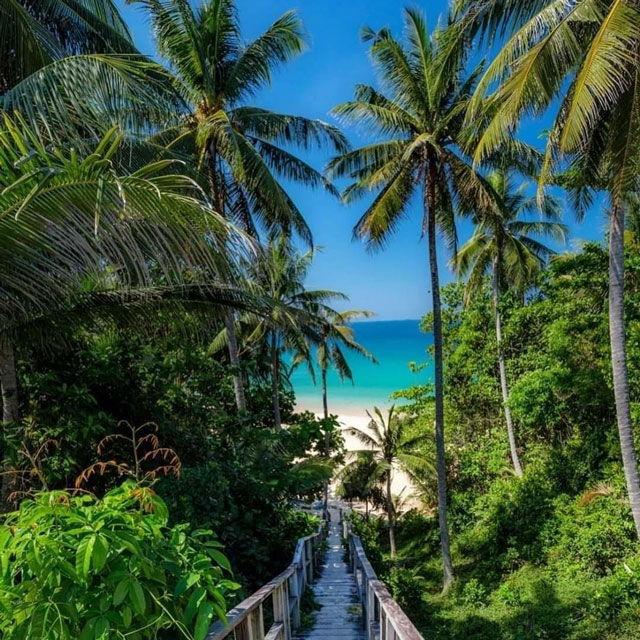
✅ Are street drinks safe?
Yes! The teas, coffees, and smoothies sold at street stalls are safe. Vendors always use filtered water that they purchase, so you won’t have any issues.
✅ Is it safe to have drinks with ice?
Yes, ice in Thailand is safe. Vendors buy ice, which is made from filtered water. While some websites still advise against it, that information is outdated.
I’m speaking from experience—I lived in Thailand for three years and never had any issues with drinks containing ice, despite having countless of them. I also don’t know any Thais or expats who avoid it for safety reasons.
Filtered water is so cheap that no vendor would risk their business by cutting corners on ice and making customers sick.
Tea, coffee, and smoothies are a huge part of daily life in Thailand, and on a hot day (which is every day), nothing beats a refreshing cold drink. 🍹

Final Thoughts
These are my best Thailand travel tips, a country that will amaze you with its food, landscapes, and people.
In this guide to Thailand you can keep reading the main articles I’ve written about this beautiful country.
If you have any questions, leave me a comment below and I'll help you as much as I can. If you found the article useful, share it with other travelers. Have a good trip! 😘
More about Thailand and Southeast Asia
- Thailand Itinerary 2 weeks: Must-Sees
- What to bring to Southeast Asia: 47 essentials
- Where to Stay in Bangkok: Best Areas and Hotels
- 8 PERFECT Day Trips from Krabi
- How to get from Krabi to Phi Phi: all the alternatives
- What to buy in Thailand: 20 Souvenirs and Gifts

Hi, I’m Andrea, creator and author of Viajeros Activos (Active Travelers). I write about Southeast Asia, the Caucasus, and Europe. I’m a full-time traveler, passionate about good food, and always looking for new adventures.

Hello, I would appreciate if you could tell me how to travel to Thailand in a group. I know the country from a trip I took with a friend, but now I would like to see the north, I travel alone and I don't speak English…. thank you so much!! (I would travel from Bangkok)
Hi Alicia
This 8 day group tour is the best, they take you to see the best of the north, or this another 5 days, both are with a guide in Spanish.
Have a good trip!
Hello! Is it advisable to hire a guide to visit the temples in Bangkok?
Thank you very much in advance!
Greetings!
Hello Paul
It depends on your preferences. You can visit the temples on your own without any problems, of course a guide will tell you many interesting details.
Have a good trip!
Your advice is very interesting. I'm traveling in October.
Thanks for your comment, Ruben, and have a good trip! 🙂